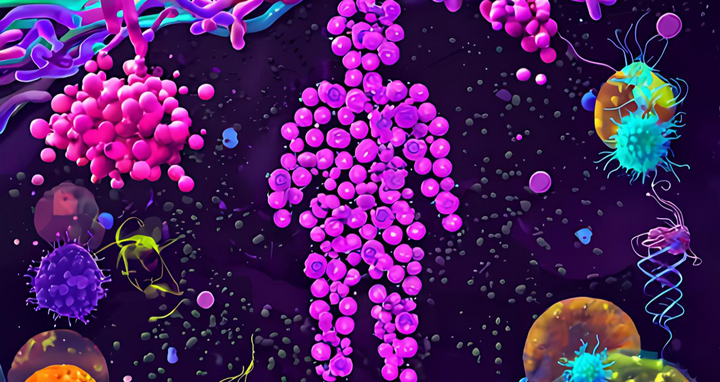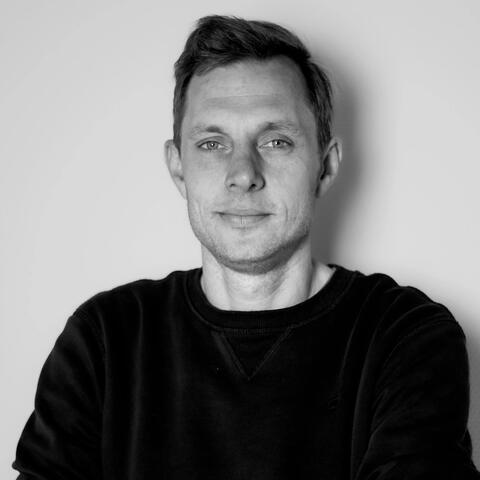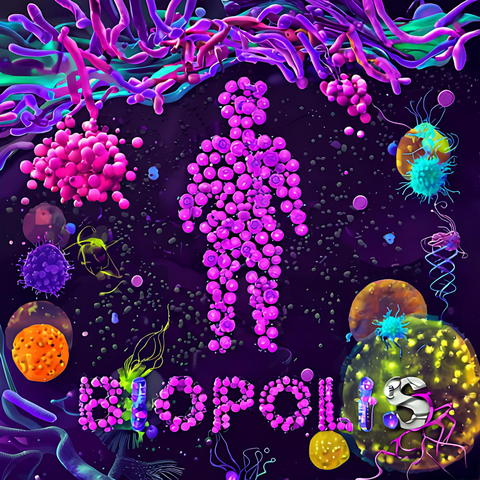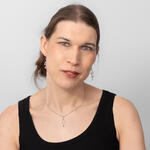“These organisms help define who we are”
Our bodies host more microbes than human cells. Without them, we couldn’t survive. They’ve been around far longer than we have – and connect us to the world around us. Yet we rarely notice them, we treat them poorly, and in doing so, we harm ourselves. Dr. Theda Bartolomaeus and podcast creator Michiel van Poelgeest want to change that. Their podcast “Biopolis” is an experiment that blends fiction and research from the Max Delbrück Center and other institutions. A science-fiction story about a dangerous voyage into the human body serves as a narrative thread that runs through all six episodes.
Theda Bartolomaeus
“Biopolis” launched during the 2025 Long Night of the Sciences in Berlin. All six episodes are now available online. The Max Delbrück Center supported the production. In this interview, Bartolomaeus and van Poelgeest explain how the idea came about – and what parallels they see between the microbiome and our society.
Dr. Bartolomaeus, you do research at the Max Delbrück Center, while Mr. van Poelgeest is based in Leiden, the Netherlands, working as a podcast writer. How did you two connect?
Bartolomaeus: In spring 2024, I was a guest at the Silbersalz Festival in Halle/Saale, where people from science, film, and media come together for workshops and panel discussions. I took part in a session on how to communicate your research more effectively. One part involved short one-on-one meetings where you had to quickly pitch your work…
van Poelgeest: …and that’s where I met Theda. We clicked right away, partly because we’re both into science fiction. The fictional story of a researcher traveling into the microbiome – to a place called “Biopolis” – is the central narrative of the podcast.
What was the concept?
van Poelgeest: We wanted to capture the fascination Theda has for the subject – something she also inspired in me. We decided that enthusiasm should be at the heart of the podcast.
Bartolomaeus: Another key theme was urgency. Our microbiome is under threat, and so is our health. Antibiotics are becoming less effective – not just because we use them to treat people, but also because they’re used in animals. Unlike us, bacteria have what you might call a superpower: they can quickly adapt and develop resistance through horizontal gene transfer. That means they just swap helpful genes among themselves. And when antibiotics no longer work, things get complicated fast.
Who is the target audience of Biopolis?
Michiel van Poelgeest
van Poelgeest: Curious listeners who don’t yet know much about the microbiome. We wanted to raise awareness of how central it is to our existence on this planet and make it clear: we need to take care of it!
Bartolomaeus: Individualistic thinking is very popular right now. We tend to focus on protecting ourselves and forget how deeply interconnected we all are. We rely on foreign organisms – bacteria in our bodies – to break down food and supply nutrients that we can’t live without. That’s why it’s so important to understand the microbiome’s role in ensuring our health.
How are the episodes structured?
van Poelgeest: We start from the beginning, explaining what the microbiome is, what bacteria are, and what they do. The first episode introduces Theda and how she got interested in the microbiome. Each subsequent episode features a different expert. Things get a bit more complex as we go.
There are already quite a few podcasts about the microbiome. What sets yours apart?
van Poelgeest: We describe it as a narrative audio series. Listening to “Biopolis” is like watching a movie in your head. We present the microbiome as a kind of interface between the outer and inner world. Every fictional segment mirrors the scientific content of that episode. We wanted to hook the audience. “Biopolis “offers much more than a simple back-and-forth conversation.
One episode features Sofia Forslund, who also works at the Max Delbrück Center. What does she talk about?
Bartolomaeus: Sofia discusses resilience and diversity. Microbial communities thrive under diverse conditions – they need things like a fiber-rich diet, for example. Diversity is key for a system to work. And that applies to our society, too, especially in places where diversity is under attack.
What did you personally take away from working on the podcast?
Bartolomaeus: As a researcher, I focus on the details. Talking about the broader context was a challenge. Michiel helped me think differently, asking things like, ‘why do bacteria do what they do?’ It’s a question I’d never really considered. In science, you have to move fast, constantly producing data and results, and that can take the wonder out of it. Now, bacteria are more than just a topic for my next scientific publication. I see them as organisms that help determine who we are and that contribute to our physical and mental health.
Interview: Wiebke Peters









